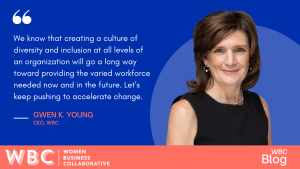
The International Women’s Day (IWD) 2024 campaign theme, “Inspire Inclusion,” highlights the importance of understanding and valuing women’s inclusion: with more women actively participating fully in a broad range of fields, at all levels, in all industries, we will inevitably see the kind of positive, sustainable change that leads to a better world.
This theme resonates particularly in the growing fields of artificial intelligence and cybersecurity. There are many opportunities for women to participate in cybersecurity and AI, but the current data shows that women are less well-represented than they should be. About 16% of tech positions in Fortune 500 companies. This does not have to be the case. There are actionable solutions that companies should take to lead to greater integration of women as both leaders and users of AI.
According to a 2020 LinkedIn report, an Artificial Intelligence Specialist is the top emerging job in the United States, with hiring growth for the role increasing 74 percent annually over the past four years. There are enormous job opportunities, both now and in the future, in the emerging fields of AI and cybersecurity, and they do not all require specific engineering and math skills.
Women do not need to be left behind—there are many ways that women can and should contribute to this new wave of technology. In fact, in order to build an effective AI team, there must be a diversity of talents and skills. AI requires defining a problem for AI to solve, designing a solution, selecting data, and constructing and training the algorithms. AI is being designed to serve a diverse population. Yet, the inputs from a narrow, homogenous team will ultimately lead to unconscious biases and blind spots that could become even more entrenched in our collective mindset. Women’s viewpoints and inputs are critical to creating the most effective AI. Further, research shows that women involved at all levels in business and tech increase profits.
The same issues and opportunities abound in cybersecurity. As the world adapts to a digital landscape, the threats of cybercrime have increased dramatically, yet companies around the world have found it difficult to fill cybersecurity positions. According to Cyber Ventures, 57% of organizations report unfilled cybersecurity positions, and data from 2021 revealed that the global cybersecurity workforce was short some 3.5 million workers. Not surprisingly, 75% of the jobs in cybersecurity are currently held by men.
Women are needed, but there is a persistent underrepresentation in AI and cybersecurity jobs—less than 19% of AI researchers are women, and only 26% of employees in AI and machine-learning companies are women. Only 25% of the cybersecurity workforce is made up of women. The gap between men and women in both fields is profound, and there is no time to be wasted in finding solutions to address the problem.
However, as I mentioned earlier, there are some excellent, actionable solutions that corporations can take to close the gender gap. If we want a world in which women are well-represented in AI and cybersecurity (and we most certainly do), business as usual simply has to change.
What does inclusion look like for women in AI and cybersecurity?
We can start at the beginning with companies actively recruiting women at the college level. If more women learn about and are recruited for careers in AI and cybersecurity—opportunities for English majors, Sociology majors, Art majors, not just STEM majors—we will see greater representation of women which will inevitably bring a positive transformation in the workforce. Women tend to thrive in organizations in which they are not the only ones at the conference table or in the cafeteria. Tokenism doesn’t help. We need to see at least 30% of a company’s workforce made up of women to achieve the kind of change that is long-lasting.
Another actionable step? Equal pay and equal treatment. They go a long way toward building a diverse workforce. Corporations should make a commitment to building a culture that is welcoming, and that values the contributions of many voices, including women and especially women of color. Equal pay and equal opportunities for promotion are basic steps a company can take to ensure that women are perceived as valued members of the team. Accountability matters too. When managers, directors, and members of the C Suite all have performance metrics around their efforts to build an inclusive environment that promotes the participation of women and women of color, there is a greater likelihood that the values of diversity, equity, and inclusion are achieved.
To be sure, there is value in building skills in these rapidly emerging fields. The WBC Cyber Governance Collaborative is addressing this through a certificate program that recruits women leaders to receive high-quality training in cyber issues to better prepare them for leadership challenges in the workplace and the boardroom.
Finally, understanding and valuing women’s inclusion is critical to recruitment, retention, and promotion in all fields, as well as those focused on technology, including AI and cybersecurity roles, not only in tech companies but all industries. Studies have shown that women simply don’t feel appreciated and welcomed in these two fields that men still dominate, and they want more than to be sitting on the outer edge of the circle of the boy’s club. Training needs to be available to and targeted at both women in men. Companies must focus on intentional recruitment, promotion, and retention, as well as on creating a culture that is inclusive and values diverse perspectives, input, and engagement.
We know that women belong in AI and cybersecurity. We know that diversity strengthens a company’s performance. We know that creating a culture of diversity and inclusion at all levels of an organization will go a long way toward providing the varied workforce needed now and in the future. Let’s keep pushing to accelerate change. We can do this together!
Gwen K. Young
CEO, WBC



